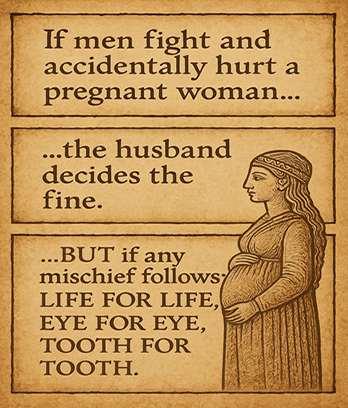The Bible's Only Verse on Abortion

No other part of the bible comes closer to discussing abortion than Exodus 21:22-25. While other passages are used in theological debates to build a case about the value of prenatal life, Exodus 21:22-25 remains unique. It is the only text that presents a direct, non-poetic, legal case study involving the loss of a pregnancy due to human action and prescribes a specific penalty for it.
If your church teaches abortion is murder, your church is teaching Eisegesis (pronounced ais-uh-JEE-sis) which is when you read your own ideas into a text. Thou shalt not kill does not mean you cannot defend yourself from a deadly attack. A pacifist eisegete might say there is no exception - ever. Their personal view distorts the actual meaning. So it is with Exodus 21:22-25.
To quote:
Dr. Michael Coogan of Harvard Divinity School: “The law in Exodus 21:22-25... distinguishes between the woman and her fetus. If the pregnant woman herself is injured or killed, then the offender is subject to the principle of ‘life for life, eye for eye.’ But if the only result is a miscarriage—the expulsion of the fetus from the womb, prematurely and not yet viable—then the penalty is only a fine... The fetus, then, is not considered a person; if it were, then the principle of ‘life for life’ would presumably apply, as it does if the woman is killed."
Dr. Bruce Waltke, a highly influential conservative evangelical scholar and Hebrew expert: "The Bible does not regard the fetus as a soul, no matter how far gestation has progressed. The Law clearly exacts lex talionis only if the mother is injured... The fetus is not reckoned as a soul."
Dr. James K. Hoffmeier, an Egyptologist and Old Testament scholar: "What is striking about the biblical law is that the concern is for the mother, not the fetus... The ‘harm’ that triggers the lex talionis is harm to the woman."
Hebrew version of Exodus 21:22-25
“When men strive together and they strike a pregnant woman (אִשָּׁה הָרָה - ishah harah) so that her children come out (יָצָא - yatsa), but there is no harm (אָסוֹן - 'āsôn), he shall surely be fined... But if there is harm (אָסוֹן - 'āsôn), then you shall pay life for life, eye for eye...”
Septuagint (Greek) version of Exodus 21:22-25
“If two men strive and they strike a woman having in womb (γυναῖκα ἐν γαστρὶ ἔχουσαν - gynaika en gastri echousan) so that her child comes out (ἐξέλθῃ - exelthē), not fully formed (μὴ ἐξεικονισμένον - mē exeikonoménon), he shall be fined with a fine... But if it is fully formed (ἐξεικονισμένον ᾖ - exeikonoménon ē), then you shall pay life for life, eye for eye...”
The oldest KNOWN surviving COMPLETE VERSE of Exodus 21:22-25 is from the Septuagint, specifically Papyrus Fouad 266, which is dated to circa 200-100 BCE.
Not one COMPLETE copy of Hebrew texts of Exodus 21:22-25 has survived to date. Unless and until a complete copy of the Hebrew version from this era is found, the Septuagint remains the oldest and most complete witness we have to this scripture.
The Septuagint distinguishes between fully formed and not fully formed fetuses. If the woman in the scenario was 15 weeks pregnant, was struck by one of the men fighting, and had a miscarriage, the penalty would be a fine. If the fetus was considered a person, the penalty would be life for life.
This demolishes the 'abortion is murder because the Bible tells me so' claim, because the Bible, in fact, tells us the exact opposite. The bible does not, expressly or implied, say abortion is murder. Only politically motivated Eisegesis does.